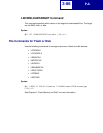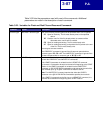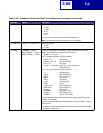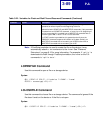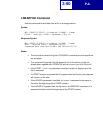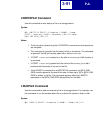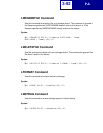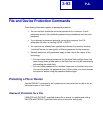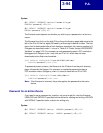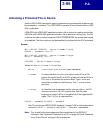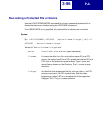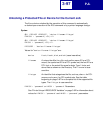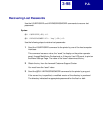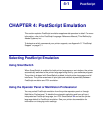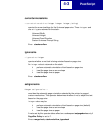
PJL
3-94
Syntax:
@PJL DEFAULT LRESOURCE:"device:filename.filetype"
LRWLOCK="password"[<CR>]<LF>
@PJL DEFAULT LRESOURCE:"device:filename.filetype"
LWLOCK="password"[<CR>]<LF>
The filename used depends on whether you wish to put a password on a font or a
macro.
The filename for a font is a five digit ID from the print directory page (add zeros to the
left of the ID to fill the five digits) followed by a three digit instance number. The first
time a font is downloaded after a flash has been formatted, the instance number is 0.
Filetypes are described under
filename in “Table 3-9: Printer Unique LRESOURCE
Variables” on page 3-53. For example, to write password protect a PCL emulation
bitmapped font (filetype of
p5bitmap) with an ID of 127, which has not been
downloaded since flash was formatted:
@PJL DEFAULT LRESOURCE:"
flash:00127000.p5bitmap"
LWLOCK="
password"[<CR>]<LF>
To password protect a macro, the filename is the ID taken from the print directory
page, followed by the filetype. For example, to read/write password protect a
PCL emulation macro (filetype is
p5macro) saved to flash with an ID of 1023:
@PJL DEFAULT LRESOURCE:"
flash:1023.p5macro"
LRWLOCK="
password"[<CR>]<LF>
Note: If the filename is incorrect, the printer applies the password to the entire
device.
Password for an Entire Device
If you want to set a password on a device, not just a single file, omit the filename.
LRWLOCK with DEFAULT specified locks a device for reading and writing. LWLOCK
with DEFAULT specified locks a device for writing only.
Syntax:
@PJL DEFAULT LRESOURCE:"device:" LRWLOCK="password"[<CR>]<LF>
@PJL DEFAULT LRESOURCE:"device:" LWLOCK="password"[<CR>]<LF>



